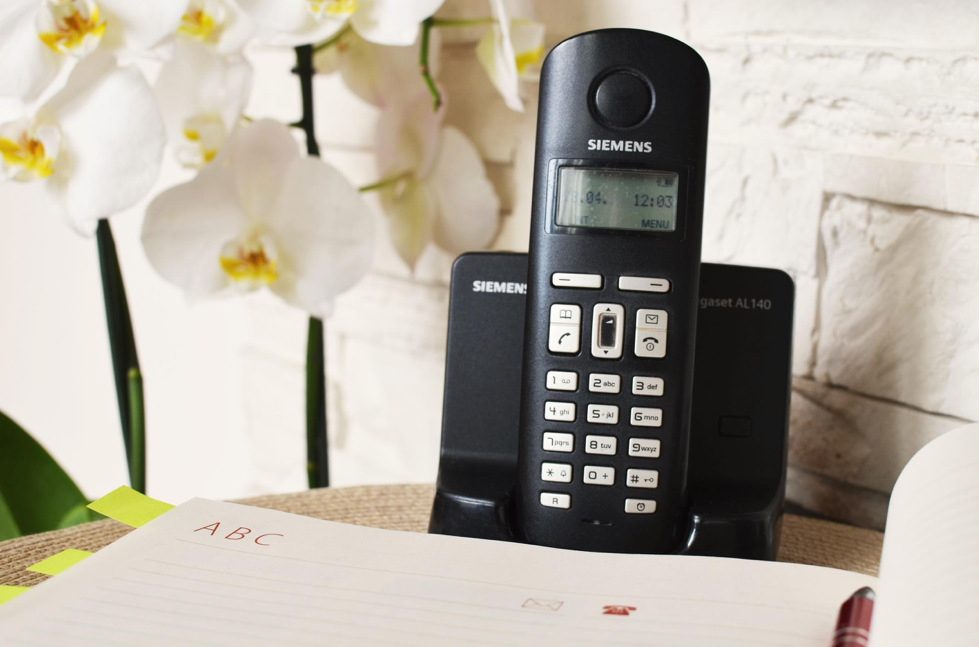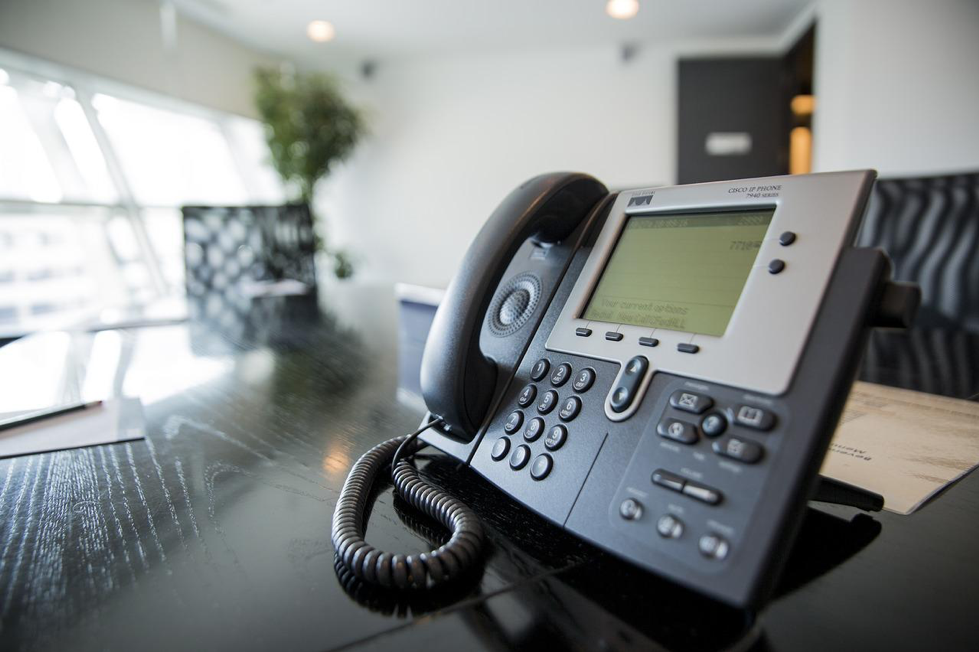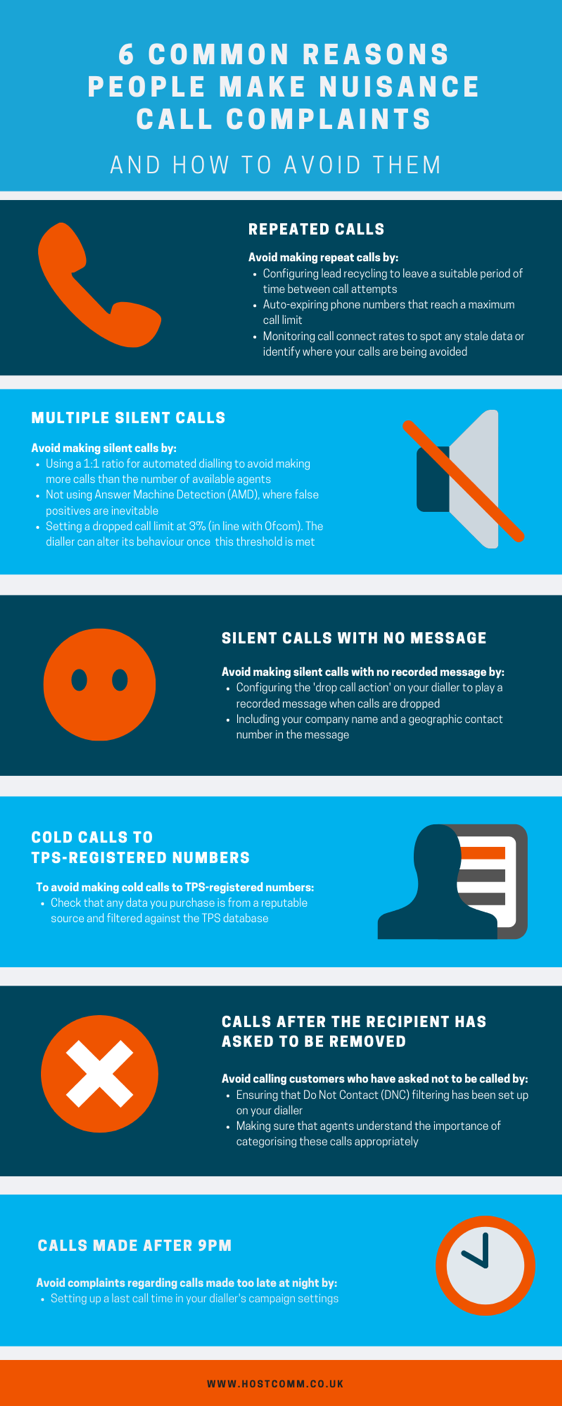While no call centre intends to make nuisance calls, mistakes can occur. Some customers will ignore such calls, but others may be frustrated enough to make a complaint. We take a look at six of the most common reasons a customer will submit a nuisance call complaint and how you can protect your contact centre from such complaints.
Why is it Important to Avoid Making Nuisance Calls?
Mistakenly calling a customer who has asked not to be contacted, or having your customers answer the phone to silence may only seem like a simple error to you. However, to your customer, this may be perceived as nuisance calling. Some customers will simply ignore nuisance calls; however, others may decide to lodge a complaint. Complaints can cause your businesses reputation to be damaged and can even lead to investigations. If you are found to have breached GDPR compliance, or other applicable regulations, such as Ofcom, then it is also likely that you will receive a fine.

Reason 1: Repeated, Answered or Unanswered Calls
A dialler will attempt to make contact with every lead it has. It will use automated lead recycling to call the same numbers again if the call to that number isn’t answered the first time around. However, if your automated lead recycling is poorly configured, then it could leave your customers being called repeatedly in a short space of time. This can be very annoying and is one of the main reasons that customers lodge complaints with the Information Commissioner's Office (ICO).
To avoid such complaints, your lead recycling should be configured so that it leaves a reasonable amount of time between call attempts. In addition, a well-configured system will also remove numbers that have been called several times already from their call lists.

Reason 2: Multiple Silent Calls
Sometimes, when a customer answers a call, they may be met with silence. For customers, this is a particularly frustrating experience, and if it happens multiple times, a complaint is likely. Silent calls occur when the call is dropped or abandoned before the customer gets to speak to an agent. There are two common causes for such calls: Answering Machine Detection false positives and no free agents being available.
Answering Machine Detection (AMD) False Positives
Answering Machine Detection (AMD) systems are used to detect when calls are going to be answered by machines. If the AMD thinks that a call is going to an answering machine, then it will disconnect the call, rather than send them to an agent. This saves call centres a lot of time; however, these systems are not always 100 percent accurate. If they are not configured correctly, AMD systems can cause calls to be disconnected, even when a human has answered rather than a machine.
No Free Agents to Take Calls
To minimise the amount of time agents are off the phone between calls, a dialler can work in ‘ratio mode’. This means that several calls will be made for each agent, on the assumption that not all calls will be answered. For example, if the ratio is 2:1, there will be two calls made for each agent that is available. However, this will inevitably lead to some calls needing to be dropped as there are not enough agents to cover all of the calls being answered. While dropped calls are permitted by Ofcom regulations, they must be kept under 3 percent. If this threshold is met, then the dialler will need to be altered to avoid dropping any more calls.

Reason 3: Silent Calls With No Recorded Message
A large number of complaints are made to the ICO from customers who received silent calls from unidentified companies. While it is likely that you will end up dropping some calls to customers, you are obliged to identify yourself to the person you are calling. Within two seconds of the call being dropped, your dialler must connect your customer to a recorded message. This message should contain the name of the caller and a geographic contact number (not a premium rate number that will cost your customer to call).

Reason 4: Cold Calls to TPS-Registered Numbers
The Telephone Preference Service (TPS) database allows consumers to opt-out of unsolicited marketing and sales calls. Contact centres are therefore obliged to check all data against this database and are not permitted to call listed numbers. Customers who have already registered with the TPS are likely to make a complaint if your agents attempt to call them. It is, therefore, essential that you do not contact someone who has registered with the TPS! You must verify with the company that provides your data lists that all of the data is filtered against the TPS database before using it as part of a campaign.

Reason 5: Calls After the Recipient Has Asked to be Removed
When somebody your agents call asks to be removed from your list, this must be taken very seriously. Continuing to call the number is a serious breach of Ofcom regulations, and complaints about this type of behaviour are taken very seriously. Most contact centres are happy to comply with requests to be removed. This involves dispositioning the call as ‘DO NOT CALL’, or DNC. Once the number is marked in this way, the dialler will not call it again. However, it’s easy to start working with a new data list that contains the same number. This is the most common cause of repeated calls after verbal requests for removal.

Reason 6: Calls Made After 9pm
Another common cause for customer complaints to the ICO is from calls made after 9pm. Ofcom regulations state that no unsolicited calling can take place after 21:00. Your dialler should be configured so that it stops making calls by this time.

Using an automated dialler has its advantages and disadvantages. While you can significantly increase agent productivity, eliminate downtime, and achieve better results from your campaigns, you also need to stay in control of your calling – and on the right side of the legislation. A dialler can cause many of the issues mentioned in this article; however, employing an intelligent dialler configuration can easily remedy all of these causes for complaint.
Here at Hostcomm, we can help you to use your hosted dialler in the UK with more confidence by providing dialler training before it goes live. This will help you to gain a better understanding of Ofcom regulations, as well as to ensure that your dialler is pre-configured to stay within the guidelines set out by Ofcom. Hostcomm also provides regular monitoring of your campaigns to ensure they remain compliant, in addition to hand-outs and videos to offer guidance with your dialler.












